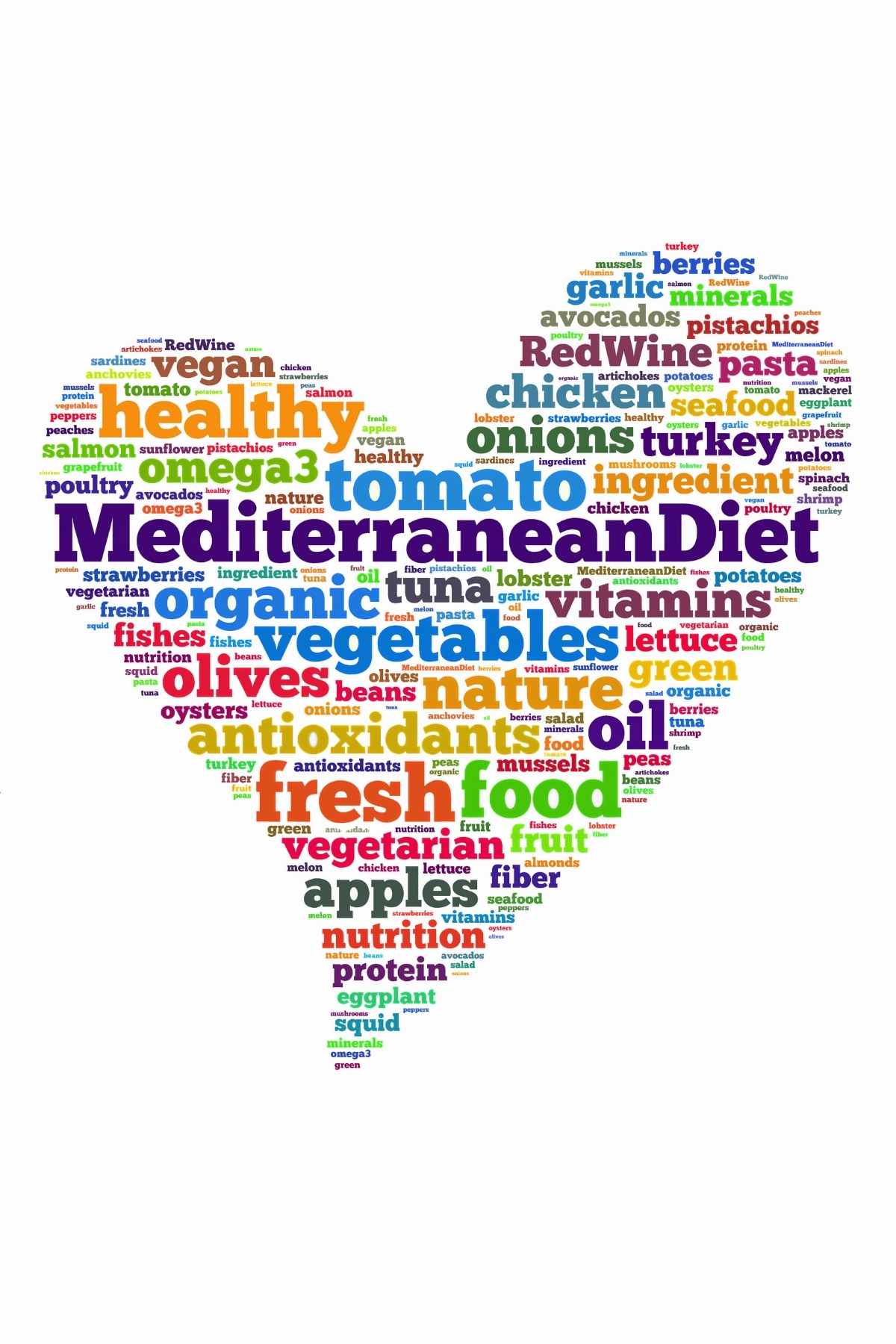The trend of healthy eating for a healthy life is encouraging people to embrace different forms of eating pattern that suits them best. These forms of eating style travel from one country to the other, bringing about a shift in dietary choices of people for better living. One such diet that we are discussing today has traveled all the way from countries around the Mediterranean Sea and is called the Mediterranean diet. It's the #1 rated Diet today.
This traditional diet of people residing near the Mediterranean Sea is being hailed for its incredible health benefits, especially for the heart. Various studies have reported that life expectancies are higher and mortality rates are lower in countries around the Mediterranean Sea. It is also proved that people who follow the Mediterranean diet suffer less from cardiovascular diseases than those American diet followers.
So, what is a Mediterranean diet? What do to eat? What are the pros and cons of it? Get answers to all these questions further in this article.
Also, read:
Flexitarian diet - All that You need to know

📝 Mediterranean diet meaning
This concept of diet came up during 1960 when various studies opened the secrets lying beneath this diet. The Mediterranean diet is inspired by the eating patterns of countries mainly Greece, Spain, and Italy. Though there are various other Mediterranean countries that follow a similar diet with little alterations according to their eating ways. It mainly consists of plant-derived food such as fruits and green vegetables, and moderate inclusion of meat, wine, dairy products, etc. It is formed in such a way to create a balance between both the plant products and animal products to avail the nutritional benefits of both of them in an appropriate amount.

🥘 What Does the Mediterranean diet consist of?

High consumption foods:
• Olive oil is the principal source of fat or avocado oil.
• Legumes like peas, beans, lentils, tofu, etc.
• Unrefined cereals like whole grains, quinoa, bulgur wheat, and oatmeal
• Fresh fruits as desserts or snacks
• Leafy green vegetables can be both starchy and non-starchy.
• Nuts like hazelnuts, walnuts, and almonds
• Seeds like sunflower seeds and pumpkin seeds
• Herbs, spices, and peppers including mint, garlic, cinnamon, etc.
Moderate to high consumption:

• Fish and other seafood, poultry, eggs, dairy products like cottage cheese, goat cheese, milk, and greek yogurt, honey, moderate wine consumption, and canola oil.
🍱 What foods are not allowed in the Mediterranean?

The Mediterranean diet avoids unhealthy fats and sugar that can harm our bodies in many ways. Processed meat products like sausages, chicken nuggets, and hot dogs, red meat like beef and pork, refined carbohydrates foods, refined sugar, white sugar, sweetened beverages, refined oils, trans fats, refined grains, refined wheat, sweets, and other processed foods are not allowed in the Mediterranean diet.
🍳 What do you eat for breakfast on a Mediterranean diet?
For breakfast, the Mediterranean diet focuses on including food that would provide you sufficient energy, to begin with, your day and carry out daily tasks without feeling tired. It mainly includes oatmeal, scrambles, avocado, bread toasts, and eggs with fruits, nuts, seeds, or vegetables like onion, spinach, and tomatoes. It is advisable to restrain from eating fried items in the breakfast. Occasionally consumption of dairy products like cheese, milk, and honey is allowed.
⌚️ How long should you stay on the Mediterranean diet?
According to studies and researches, the Mediterranean diet ensures long-term good health if it is well planned and suits the follower’s lifestyle. There is no such reason that restricts this diet up to a certain extent only. Rather people are encouraged to welcome this diet for its incredible nutrient values and health perks. However, if you desire to follow it for specific purposes then you may set goals. For instance, the Mediterranean diet is recommended to be followed up to 6 months for weight loss.
💪 Mediterranean diet Health Benefits

• Mediterranean diet for weight loss
The Mediterranean diet encourages less intake of calories and unhealthy fats. It precisely suggests avoiding food that could increase the weight of a person. Limited intake of non-vegetarian foods, less sugar, and low carb in this diet are highly profitable for overweight people. Moreover, rich dietary fibers in this dietary pattern keep you full for a long period so that you avoid eating very frequently. With these well-planned and well-selected food items in your daily meal, you can reduce excess weight. This diet is also advisable to cure obesity and maintain a healthy weight.
• Prevents cardiovascular diseases
There are numerous studies and research that found desirable effects on the functioning of the heart of the people who followed the Mediterranean diet. A diet rich in natural nutrients derived from plants can help to protect your heart. It is low in unsaturated fats and carbohydrates which are unhealthy for the heart. Rather, a high concentration of monounsaturated fats, dietary fibers, and proteins in this diet bless your heart by lowering cholesterol levels, regulating blood flow, strengthening arteries, and stabilizing blood pressure. Olive oil is believed to be one of the main reasons behind the good health of the heart. According to the American Heart Association, this dietary pattern is considered effective to reduce the risk of cardiovascular diseases
• Treats Cancer and Parkinson’s diseases
This nutrient-dense diet contains a high level of antioxidants and anti-inflammatory abilities that protects our cells from oxidative stress that damages cells and further spread cancer and other types of diseases in the body. The antioxidants fight off these cancer-causing cells and prevent them from spreading in the body. There are studies that show a decrease in the death rate due to cancer in the places where the Mediterranean diet is followed. It is also efficient against the spread of Parkinson’s diseases in our bodies.
• Cures Type 2 Diabetes
The Mediterranean diet excludes refined sugar, sweetened beverages, and other processed foods that could lead to blood sugar spikes and further create problematic disturbances in our bodies. Also, the low glycemic index of this diet is a bonus for diabetic patients. They are recommended to take low carb, low sugar, high fiber, and proteins that reduce weight and balance blood sugar. The Mediterranean diet provides all these necessities that a diabetic patient is recommended to consume.
• Enhances cognitive function
Studies have shown that people who follow a Mediterranean diet have good cognitive abilities. The rich minerals and vitamins accelerate the memory capacity, thinking power, and overall cognitive functions of a person. It is also believed to lessen the risk of Alzheimer's issues and dementia. It is also highly effective to come out of depression. A good diet positively impacts the mental health as well as physical health of a person.
🙅♀️ Disadvantages of the Mediterranean diet
The disadvantage of the Mediterranean diet is that it's not clearly prescribed as it includes an accurate amount of both plant and animal-based food items. Still, there can be problems if the diet is poorly planned.
In that case, it might lead to nutrient deficiencies of iron and calcium. If you are not conscious enough over the consumption of olive oil, you might end up gaining weight. Similarly, intake of wine also needs to be limited to avoid any physical hindrances.
Mediterranean diet consists of varieties of healthy products and can have more benefits than the ones mentioned above. It totally depends upon how you decide your meal intake throughout the day.
A well-planned diet can indeed boost your abilities and powers to work effectively. Additionally, this diet is also proved to benefit one with sound sleep. Ideally, a sound mind and a sound body are all that one needs to live a healthy life.
Improvement in sleep quality, low blood pressure, a balanced weight, a healthy heart, and other benefits of this particular diet eventually ensure a long and healthy life.
🤨 Frequently Asked Questions
Q. Is Honey OK on the Mediterranean diet?
Ans. Yes. Honey can be used in moderation but sugar should be avoided completely.
Q. What kind of cheese is allowed on the Mediterranean diet?
Ans. Parmesan, feta, or part-skim mozzarella cheese are allowed to include moderately in the Mediterranean dist.
Q. Can you eat canned tuna on the Mediterranean diet?
Ans. Yes. Tuna is a rich source of proteins and omega 3 fatty acids. It is low in calories and fats. You can easily take it with sandwiches, pasta, and salads.
Q. Is peanut butter allowed on the Mediterranean diet?
Ans. Yes. Peanut butter is capable of keeping you full to aid in weight loss.
Q. How often can you eat chicken on the Mediterranean diet?
Ans. Chicken can be consumed in moderate portions daily or weekly.
Q. How many eggs can you eat on the Mediterranean diet?
Ans. Two eggs per day are recommended for adults but people with high cholesterol are advised to include 4 yolks per week.
Q. Can I drink milk on a Mediterranean diet?
Ans. Milk can be consumed in moderation however, it is advised to substitute it with almond or soy milk.
Q. What desserts can I eat on the Mediterranean diet?
Ans. Desserts are to be avoided as much as possible. Homemade healthy sweets can be enjoyed moderately. Desserts and cakes are made of honey, yogurt, fruits, olive oil, and nuts.


Ask Me Anything